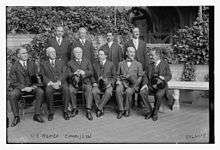John Mott
| John Raleigh Mott | |
|---|---|
 Mott circa 1946 | |
| Born |
May 25, 1865 Livingston Manor, Sullivan County, New York, U.S. |
| Died |
January 31, 1955 (aged 89) Orlando, Florida, U.S. |
| Alma mater | |
| Occupation | Activist |
| Organization | YMCA, World Student Christian Federation |
| Religion | Christianity (Methodist) |
| Spouse(s) | Leila Ada White (m. 1891) |
| Parent(s) |
John Mott, Sr. Elmira (Dodge) Mott |
| Awards | Nobel Peace Prize (1946) |

John Raleigh Mott (May 25, 1865 – January 31, 1955) was a long-serving leader of the Young Men's Christian Association (YMCA) and the World Student Christian Federation (WSCF). He received the Nobel Peace Prize in 1946 for his work in establishing and strengthening international Protestant Christian student organizations that worked to promote peace. He shared the prize with Emily Balch. From 1895 until 1920 Mott was the General Secretary of the WSCF. Intimately involved in the formation of the World Council of Churches in 1948, that body elected him as a lifelong honorary President. His best-known book, The Evangelization of the World in this Generation, became a missionary slogan in the early 20th century.[1]
Biography
Mott was born in Livingston Manor, New York, Sullivan County, New York on May 25, 1865, and his family moved to Postville, Iowa in September of the same year. He attended Upper Iowa University, where he studied history and was an award-winning student debater. He transferred to Cornell University, where he received his bachelor's degree in 1888. He was influenced by Arthur Tappan Pierson one of the forces behind the Student Volunteer Movement for Foreign Missions, which was founded in 1886. Mott married Leila Ada White (1866-1952) in 1891 and had two sons and two daughters.
In 1910, Mott, an American Methodist layperson, presided at the 1910 World Missionary Conference, which was an important milestone in the modern Protestant missions movement and some say the modern ecumenical movement.
Mott and a colleague were offered free passage on the Titanic in 1912 by a White Star Line official who was interested in their work, but they declined and took the more humble liner the SS Lapland. According to a biography by C. Howard Hopkins, upon hearing of the news in New York City, the two men looked at each other and remarked that, "The Good Lord must have more work for us to do."[2]
After touring Europe and promoting ecumenism, Mott traveled to Asia where, from October 1912 to May 1913, he held a series of 18 regional and national conferences, including in Ceylon, India, Burma, Malaya, China, Korea and Japan.[3]
He also worked with Robert Hallowell Gardiner III to maintain relations with the Russian Orthodox Church, and Archbishops Tikhon after the Russian Revolution.
From 1920 until 1928, Mott served as the WSCF Chairperson. For his labors in both missions and ecumenism, as well as for peace, some historians consider him to be "the most widely traveled and universally trusted Christian leader of his time".[4]
Legacy
The papers of John R. Mott are held at the Yale Divinity School Library.[5]
Veneration
Mott is honored with a feast day on the liturgical calendar of the Episcopal Church (USA) on October 3.
Writings
- The Decisive Hour of Christian Missions (1910)
- World Student Christian Federation (1920)
- Cooperation and the World Mission (1935)
- Methodists United for Action (1939)
- The Larger Evangelism (1945)
See also
References
- ↑ Cracknell & White, 233
- ↑ Greg Daugherty (March 2012). "Seven Famous People Who Missed the Titanic". Smithsonian Magazine.
- ↑ A History of the Ecumenical Movement 1517-1848, 2d edition, p. 364
- ↑ Cracknell & White, 243
- ↑ Yale University Divinity School Library. hdl.handle.net
Bibliography
- Cracknell, Kenneth and Susan J. White. An Introduction to World Methodism. Cambridge: Cambridge University Press, 2005. ISBN 0-521-81849-4.
Further reading
- Fisher, Galen Merriam. John R. Mott: Architect of Cooperation and Unity. New York: Association Press, 1953.
- Hopkins, Charles Howard. John R. Mott, 1865–1955. Eerdmans, 1979. ISBN 0-8028-3525-2.
- Mackie, Robert C. Layman Extraordinary: John R. Mott, 1865–1955. London, Hodder & Stoughton, 1965.
- Matthews, Basil Joseph. John R. Mott: World Citizen. New York, Harper, 1934.
- Mott, John Raleigh. The Evangelization of the World in This Generation. Arno, 1972. ISBN 0-405-04078-4.
- Козловський С. Біля витоків екуменізму: "апостол студентства" Джон Мотт / Сергій Козловський // Духовність. Постаті. – [Електронний ресурс] – Режим доступу до публікації: http://www.dukhovnist.in.ua/uk/postaty/69-mott.html
External links
| Wikimedia Commons has media related to John Raleigh Mott. |
- Nobel Committee information on 1946 Peace laureates
- Biography at Nobelprize.org
- World Student Christian Federation